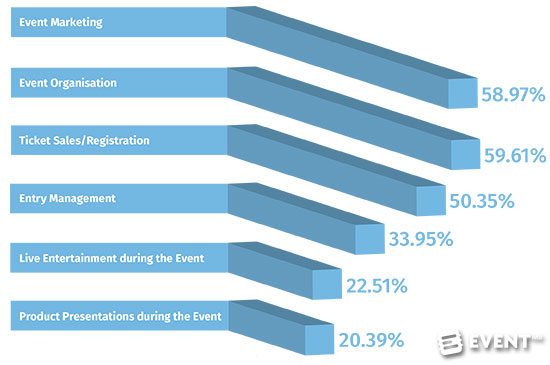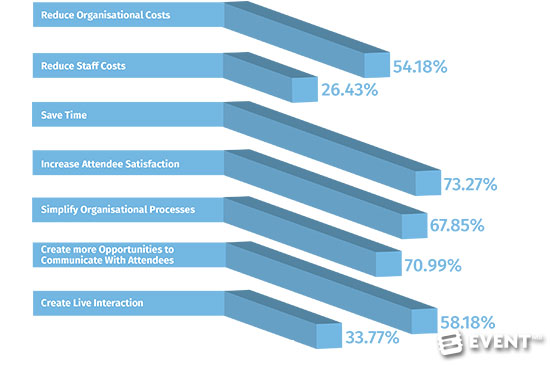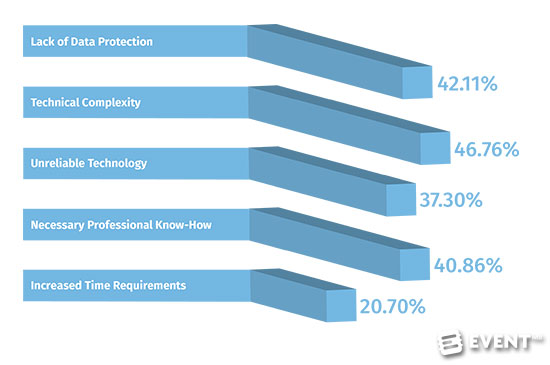This is a sponsored post written by Myriam van Alphen-Schrade, Senior PR & Communication Manager, XING Events GmbH. More information about Event Manager Blog’s sponsored posts.
Virtual Reality glasses for a breath-taking spatial experience, event information via an App or Smart Watches as a teleprompter. Cutting-edge, high-tech solutions provide a big wow factor and help to increase the appeal of an event. Digital transformation in the event industry is also apparent through new digital approaches, such as the use of cloud-based event management solutions and opportunities to revise and optimise existing processes. Going digital is not a short-lived fad but has become reality for all event planners.
XING Events have shared the results of their online survey of digital transformation in the event industry, with feedback from 2,500 organisers and more than 2,000 attendees. Access the full data and recommendations via this free report.
Some of the top 4 findings of digital transformation in the event industry are:
Fact 1: Digital Solutions Are Making Event Planning Easier
Did Digitalisation optimise your event management process? If yes, please specify the areas concerned.


All event organisation phases are affected by digitalisation in the event industry. A good indicator of this development being perceived as an opportunity rather than as a risk is reflected in the answer of three-quarters of organisers who noticed a significant improvement, particularly in the area of event preparation, after using digital technologies. They believe for example that both event marketing and event organisation (59% each) are the two areas that are influenced by digital transformation the most.
The most frequently used tools in this process are digital solutions for email campaigns and for event marketing. Nearly half of the organisers are selling tickets for their events online.
More than half of the surveyed organisers want an improvement in the areas of attendee management (56%) and attendee communication (57%). The use of digital solutions has not only improved event experiences for organisers but also for a large number of attendees (65%).
74% of the attendees appreciate the resulting information transparency about the event and about half of them (50%) value the networking/matchmaking opportunities the most. Solutions targeting the period prior to an event are of special interest for attendees. Access to additional information prior to the event, networking opportunities and online ticketing are important factors in this process.
Tip: For an attendee, prospective networking opportunities are nowadays just as important as the event programme. By using matchmaking tools like people2meet by XING, members receive customised event recommendations out of more than 150,000 events on XING based on their network and profile.
Fact 2: Digital Offers Have Improved the Event Experience
What are the goals you want to achieve using digital event (management) solutions?


One of the key goals of using digital solutions is to save time and to thereby simplify organisational processes. According to the survey, most of the organisers hope to increase efficiency through the use of event management solutions.
Nearly three-quarters (68%) of organisers want to use it to increase attendee satisfaction during events. In comparison to the attendees’ survey results of whom also nearly three-quarters (65%) stated that digital offers have improved the event experience, this goal seems to almost be met.
The fact that three-quarters of organisers want to expand this area in the future is another indicator that event organisers are opting for the use of digital event management solutions in the long run.
Tip: Digital event management solutions help you to save time and resources, for example. XING Events is one of the providers of comprehensive services from planning to realising individual events.
Fact 3: Digitalisation is an Opportunity, Not a Risk
What disadvantages/risks do you identify in the use of digital event management solutions?


Despite their technical complexity and data safety concerns, the opportunities offered by digital solutions outweigh their issues for organisers and attendees.
Besides all the advantages that seem to come with the use of digital event management solutions, organisers regard their technical complexity (47%) and data safety concerns (42%) as the biggest disadvantages and risks. Nevertheless, more than three-quarters (78%) consider digitalisation to most likely be a safe endeavour.
The same number of respondents answered that the use of digital technologies would not keep them from attending an event. With regards to the 22% of respondents who would not attend an event if digital solutions are used, we can identify concerns about data protection gaps (65%) and an information overload (50%) as the main reasons.
In this context, many attendees criticise the non-functioning technology during events and the need to sign up on social media channels to buy tickets.
Fact 4: More Needs To Be Done
Especially when it comes to ticketing, the answers diverge strongly. According to the organisers, increased ticket sales (33%) and ticketing in general are not the key subjects of digitalisation. However, according to the attendees’ replies, online ticketing has become indispensable for almost all of them (89%). Therefore, there is still too big a gap between what attendees want and what organisers offer.
Tip: Before implementing digital transformation in your company or for your event, you should consider and keep in mind your future attendees’ needs. Surveys after the event help you to find out about your attendees’ suggestions for improvement and their requests for future events.
In Conclusion
The times of digital technologies being peripheral phenomena are long gone. They are rather in the process of conquering the established trade fair and event business. Both event organisers and attendees see a great opportunity in this area. It is important that organisers put a stronger focus on their attendees’ needs and tailor the use of digital solutions towards them in the future. Furthermore, digital solutions will have to become increasingly more user-friendly for organisers and attendees alike.
Access the full data and recommendations via this free report.






